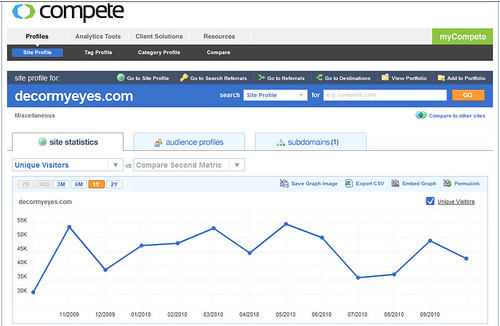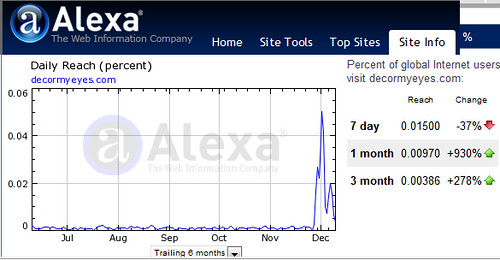All the recent hubbub over DecorMyEyes.com, and their claim that treating customers poorly in order to obtain more negative reviews resulted in better Google rankings, has left a small cloud of confusion. The ruckus was sufficient to get Google’s interest, and motivated them to react to it, but what they may have done is worth considering, not least because their statement around it has caused part of the confusion, perhaps purposefully.
First, it seems likely that Vitaly Borker, the offensive proprietor of Decor My Eyes, is likely not some stealth marketing genius. Rather, he sounds more like he rationalizes bad behavior in a variety of ways, according to the NYT article about him, and one of his prime beliefs is that negative ratings have helped his Google rankings. His supposed reasons for this were likely wrong by some degree, but he may’ve accidentally derived some benefits from the practice without knowing actual causality.
What makes him more important is that he got Google’s attention, and caused them to react — or claim they’ve reacted — by making some changes to their algorithms. It’s possible that Google responded mainly out of concern over negative press. It’s also possible that they may’ve said they’ve made a change but did not, but it seems equally possible that they could have indeed tweaked their algorithm. The incident really seems to call for us to consider that “where there’s smoke, there may be fire.”
First of all, I think it’s worthy to note that a few different free/public analytics services appear to indicate little or no major changes to DecorMyEyes.com traffic in the past year, and they indicate the site has relatively little overall traffic anyway.
Compete.com shows fairly consistent, unremarkable traffic:
Alexa shows a sharp spike around when the New York Times article hit, and a subsequent decline, perhaps as traffic went back to normal. Previous to that, it also appears there was pretty consistent, unremarkable traffic:
So, if increasing/ongoing negative reviews helped the site in some way, it’s not clear that it was sudden, dramatic, or providing ongoing increases.
A number of people have tried to reverse-engineer what may have been happening with DecorMyEyes.com, and to also analyze what Google may have done in response. Google states that the negative ratings didn’t help the site, pointing out that a number of those sites nofollow their links. Other analysts have found that the main sources of the site’s PageRank came from links on many low-quality sites, and were likely paid links of some sort. From the Compete/Alexa evidence, it appears very likely that the main traffic to DecorMyEyes may have been primarily longer-tail traffic where they had pages that better matched phrase combinations that fewer popular sites have.
For the analysts believing Google’s statement that the nofollowed links provided no value, and instead ascribing the site’s ranking ability primarily to paid links, their seems to be a small conflict that has gone unrecognized: Google states that they are adept at recognizing paid links, and that they don’t count them. So, it seems dichotomous to simultaneously believe that the nofollowed links that a few review sites may’ve included were worthless to Decor My Eyes, while believing paid links may’ve helped.
As I pointed out in my article on the Decor My Eyes fiasco and local reviews tactics, it is possible that they could have ranked due to citations provided in the text of reviews. As you may be aware, in local search algorithm patents, Google engineers have written that it could be possible to use mere mentions of a business’s name and address information as a signal for popularity. While this may never have been used by Google in local search or otherwise, it’s possible that they have been using it and may have even extended some of the algorithmic behavior into regular web search rankings where it could affect sites like Decor My Eyes. If such a ranking factor were at play, it could also explain why major brand names seem to have better ranking ability, as many SEOs have observed.
Google’s post about their action towards Decor My Eyes is the most obscure when describing changes they made to demerit the site due to customer complaints. The rhetoric surrounding that aspect is particularly worthy of politicians. They point out that merely basing rankings or penalizations around sentiment analysis would have negative consequences — such as making it difficult to find politicians’ websites, which would be a poor consumer experience. However, they state that they’ve come up with some solution that may negatively impact sites which offer such poor customer experience.
As I noted, Google personnel have explicitly stated that they may choose to still use some nofollowed links from sites with data that they deem to be valuable. So, it’s possible that they were counting links to Decor My Eyes from any consumer review site which had nofollowed links. After all, before the NYT article aired, consumer complaint sites probably were not a widely-exploited target for links, since most people would’ve assumed they would harm websites’ reputations unacceptably, counteracting any possible value obtained from their links. If this was the case, Google’s action may have been as simple as halting link flow from complaint sites.
However, another explanation could be related to both sentiment analysis and citations. If Decor My Eyes was deriving citational benefit from consumer complaint sites, Google could have applied algorithmic rules to the effect that citation rank benefit would not be passed if sentiment analysis of surrounding text/context indicated it was a complaint rather than a compliment/recommendation.
Conclusions?
- Google’s actions and rhetoric would appear to strongly indicate that there was something about what Borker was doing that may’ve benefited him. From external traffic reporting services, and from analyses of what terms the site seemed to be ranking for, it appears he was mostly getting long-tail phrase matches. However, even his ability to get longtail matches indicated he had a small amount of ranking weight from something. So, theories expressed by some people that he was doing nothing that helped him at all appear to me to be off-base. Where there’s smoke, there’s fire.
- The analysts who say that DecorMyEyes.com ranked only because of paid links, at best are painting an incomplete picture. If it was the case, Google could’ve then simply demerited the site’s external links’ voting ability and done nothing else to penalize them. However, if you’re going to believe Google any, then they are strongly suggesting they altered something else in penalizing Decor My Eyes, and you have to also suspect that many of the paid links and nofollowed links were not passing any PR anyway. If that’s so, there was some other, hidden phenomenon going on.
- Citations might be the hidden phenomenon — the “black matter” missing from our unified field theory of the ranking algorithm universe. If so, Google’s actions may’ve involved tweaking some aspect of assessment or transferring of citation ranking weight.











How about arresting the Google bosses? Many online businesses already went bankrupt because the Google management keeps on changing the search engine’s algorithms. Let’s not forget that Google is actually liable for these bankruptcies. And the company is also liable for not protecting searchers/consumers against bad businesses, a goal that can easily be achieved as you can read in http://best-inexpensive-web-hosting.com/bad-hosts-rank-high
The above link is a blog about inexpensive web hosting, but the article on the blog is about Google’s liability towards consumers and any companies in general and not only towards web hosting providers. The solution provided in the link above would benefit both reputable online businesses and consumers. I highly recommend to read the article, because it’s a perfect solution that is much better than the dangerous new Google algorithm. Just wondering when will the right Internet lawyers start suing Google?